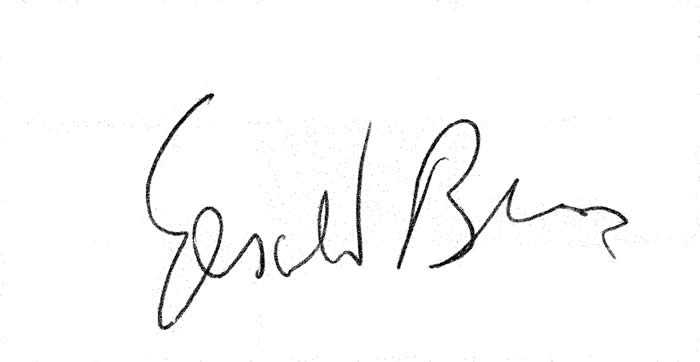
one letter at a time seeing, she said, no relation between one r and the next, each letter an
event. He had his paper and she said to him, "You know, it's almost the same word
as HORROR," showing me how she looked at him, eyes friendly and unspeakably intense.
Karloff never liked the word horror applied to his work, preferring terror, more genteel
or perhaps more of a game. There's more complicity in terror, as the body feels what
it may be made to feel, but these distinctions can fall away, as Chaplin's M. Verdoux
wanders away from either, a character in its dandyism closer to self-loathing, criticism
always a step away as Beerbohm knew. Macbeth's a critic in the "tomorrow" speech.
So we water-colorists, imitating Turner, paint Salisbury Plain, Avebury or Stonehenge stones
flooded with light from wet clouds, a few sheep, to show that a timeless thing in time
can be merely striking, diminished as in Constable an ox and cart diminishes a brook.
What's to be made of this, a Monet winter haystack (seen in Edinburgh) in golden light,
its shadows purple-blue, grotesque as MacDiarmid's giant head on tiny body, painted.
The haystack is as Stein would say "being existing," MacDiarrnid's head a protest,
perhaps against paint, any portrait head like Avebury, the sun come out a moment.
A feeling for spelling, or art, can invade your explanation, as poisoners have motives
they can't begin to understand. That haystack is obscure, not clear at all like geology,
foot of a waterfall a basin for dry stones, the expert inferring a roar of water heard half a mile away.
Terror leans on inference. Your inkwell is a well out of which anything can crawl,
hence the HRC exhibit of famous people's letters in which the pen breaks off to draw,
Faraday, Satie, even the jolly ones in an extremely odd relation to the language as written.
Turner's sketchbook, anyone's, includes names of colors floated with lines to show where they go.
A Pavement Shop
It was night (French ultramarine, Davy's gray, touch of lampblack). Pale
trees (Payne's gray, transparent olive green) by streetlamps, pointed shapes, made way
for the moon behind or just above them. In the street a cat fought off an owl,
both in a rage, the cat thinner than the ones Manet lithographed on roofs,
tail above anus. Night is peculiar, not just because everyone's in bed.
Flowers bloom in sodium glare, refuse to shut, have little smell in March.
Dickens's Gad'shill field smelled of apples, overrun with eglantine. He
walked miles at night, to see the faces, shopwindows bowed like the
one on the Bond Street can. He'd seen Manets in Paris near the Arch
but liked academicians better, stump stump, his friend Frith who painted
him turning from his desk, his face a wild surmise as if he heard the hooves
of a fire wagon turning into a hated neighbor's drive. The cat with a final yowl
escaped. That's done. He heard steps, flipped his cane a little higher in his gray-
gloved hand, imagined it was Johnson's London, there were footpads, no model jail
like the ones he'd seen in America, pantechnicons that offered you a view
of every cell, ranged in a circle like mice cages in a hatbox.
Or rat pits, with the warders terriers. Faces twisted with passion or gaunt
with hunger were meat to him, their histories visible in what they wore,
a bonnet or a shoe. At the corner a cloth laid on the pavement, lit
by two smoking roundbellied oil lamps exhibited little dolls that walked
when a young girl (twelve?) in rags but clean wound them up, automata
of the simplest, one in a top hat lurching with tiny steps as if on a
bender or wondered to find the street an acre of canvas. He had talked
to showmen, put them in Curiosity Shop, this striking child an undernourished Dorrit.
He came closer. One of these might do for little Plorn. A drunkard swore
but made no move. The Inimitable bought a windup dog he didn't want
out of pity, its key a doubled piece of flattened tin. The tail wagged, a sort of mastiff-fox
terrier crudely made. He smiled. He knew the person he would give it to.
Copyright Gerald Burns 1995-1997